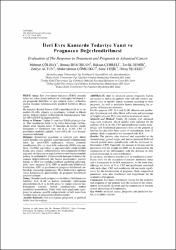| dc.contributor.author | Çölbay, Mehmet | |
| dc.contributor.author | Demirkan, Binnaz | |
| dc.contributor.author | Çehreli, Rüksan | |
| dc.contributor.author | Demir, Tevfik | |
| dc.contributor.author | Altun, Zekiye | |
| dc.contributor.author | Çömlekci, Abdurrahman | |
| dc.contributor.author | Yeşil, Sena | |
| dc.contributor.author | İşlekel, Hüray | |
| dc.date | 2015-01-29 | |
| dc.date.accessioned | 2015-01-29T09:54:01Z | |
| dc.date.available | 2015-01-29T09:54:01Z | |
| dc.date.issued | 2005-01 | |
| dc.identifier.issn | 1302-4612 | |
| dc.identifier.uri | http://hdl.handle.net/11630/1771 | |
| dc.description.abstract | Amaç: İleri evre kanser hastasına (İEKH) sistemik
tedavi mi yoksa destek tedavisi mi verileceğini belirlemek i-
çin prognostik faktörlere ve eğer sistemik tedavi verilecekse
yanıtın önceden belirlenmesinde prediktif faktörlere ihtiyaç
vardır.
Bu amaçla C-Reaktif Protein (CRP), interlökin-6 (IL-6) ve reseptörü
(IL-6R), albumin ve prealbumin, lenfosit ve lökosit
sayımı, lenfosit yüzdesi ve Biyoelektrik Empedansmetre Analizi
(BEA) İEKH’da değerlendirildi.
Gereç ve Yöntem: Toplam 24 yeni tanı İEKH çalışmaya alındı.
Tüm hastalardan bazal ve üç siklus kemoterapi verilmesinden
sonra hayatta kalan 15 hastadan da kontrol olarak;
hemogram ve biyokimya yanı sıra IL-6, IL-6R, CRP ve
prealbumin analizleri çalışıldı. Ayrıca BEA ile vücut kompozisyonları
belirlendi.
Bulgular: Kemoterapi uygulanan ve tedaviye yanıt alınan
(stabil hastalık veya parsiyel yanıt) hastalarda enflamasyonun
(akut faz yanıtı-CRP) azalmasıyla visseral proteinde
(prealbumin), kilo ve vücut kitle indeksinde (BMI) artış saptandı.
Özellikle yağ kitlesi ve yağ oranındaki artışla beraber
kiloda artış olması, enflamasyonun baskılanmasıyla birlikte
yağ asidi oksidasyonu ve yağ depolarının mobilizasyonundaki
azalma ile açıklanabilir. Çalışmamızda hastanın beslenme durumunu
değerlendirmede tek başına prealbuminin yetersiz
kaldığı ve BEA’nın mutlaka yapılması gerekliliği görülmektedir.
Aynı zamanda IL-6, CRP ve prealbumin birbirleriyle
koreleyken, CRP ve prealbuminin prognozu belirlemede anlamlılığa
ulaşmadığı saptanmıştır. BEA ölçümleriyle saptanan
vücut kompozisyon parametreleri de prognozu belirlemede
yetersiz kalmıştır.
Sonuç: Hastalarımızda prognoz ve mortaliteyi belirleyen ana
faktörler; IL-6, IL-6R ve lenfosit yüzdesidir. Enflamatuar
sitokinlerdeki (IL-6 ve IL-6R) artma ve immün sistemin baskılanmasını
yansıtan lenfosit yüzdelerindeki azalma
mortaliteyi artırmaktadır. Fakat farklı hasta gruplarında yaptı-
ğımız bu çalışma, spesifik malignitelerde ve belli tedavilerin
verildiği hasta alt gruplarında tekrarlanmalıdır. | en_US |
| dc.description.abstract | Aim: In advanced cancer, prognostic factors
are needed to define the patients who will only receive supportive
care or specific cancer treatment according to their
prognosis. As well as predictive factors determining the response
of therapy are necessary.
For this purpose CRP, IL-6 and IL-6R, albumin and prealbumin,
lymphocyte and white blood cell counts and percentage
of lymphocytes and BEA were studied in advanced cancer.
Material and Method: Totally 24 patients with advanced
stage were evaluated. Blood samples were collected for the
analyses of IL-6, IL-6R, CRP and prealbumin besides hematologic
and biochemical parameters from all the patients at
baseline but also after three cycles of chemotherapy from 15
patients. Body composition was measured with BEA.
Results: The patients who received and responded to the
chemotherapy, gained weight and had an increased BMI and
visceral protein stores (prealbumin) with the decreased inflammation
(CRP). Especially, the increase in fat mass and fat
proportion with the weight and BMI can be explained by the
suppression of the inflammation with the decrease in fatty
acid oxidation and fat store mobilization.
In our study, we observe that the level of prealbumin is insufficient
alone for the evaluation of patients' nutritional status
and it is necessary to do BIA measurment. At the same time,
although the levels of IL-6, CRP and prealbumin correlated
with each other, CRP and prealbumin did not reach significance
for the determination of prognosis. Body composition
parameters were also insufficient and insignificant for the
evaluation of prognosis.
Conclusion: The major determinant factors for the mortality
and prognosis of our patients were the increase in the inflammatory
cytokine (IL-6) levels and the suppression of immune
system (percentage of lymphocyte). | en_US |
| dc.language.iso | tur | en_US |
| dc.publisher | Afyon Kocatepe Üniversitesi, Kocatepe Tıp Dergisi | en_US |
| dc.rights | info:eu-repo/semantics/openAccess | en_US |
| dc.subject | İleri Evre Kanser | en_US |
| dc.subject | Prognostik ve Prediktif | en_US |
| dc.subject | Faktör | en_US |
| dc.subject | Akut Faz Reaktanı | en_US |
| dc.title | İleri evre kanserde tedaviye yanıt ve prognozun değerlendirilmesi | en_US |
| dc.title.alternative | Evaluation of the response to treatment and prognosis in advanced cancer | en_US |
| dc.type | article | en_US |
| dc.relation.journal | Afyon Kocatepe Üniversitesi, Kocatepe Tıp Dergisi | en_US |
| dc.department | Afyon Kocatepe Üniversitesi, Tıp Fakültesi, İç Hastalıkları Anabilim Dalı | en_US |
| dc.identifier.volume | 6 | en_US |
| dc.identifier.startpage | 17 | en_US |
| dc.identifier.endpage | 23 | en_US |
| dc.identifier.issue | 1 | en_US |
| dc.relation.publicationcategory | Makale - Ulusal Hakemli Dergi - Kurum Yayını | en_US |



















